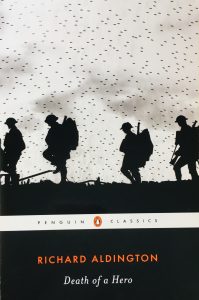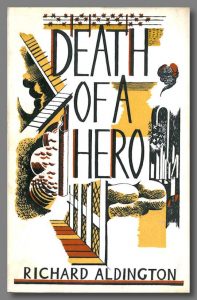
Death of a Hero
Richard Aldington
edited by James H. Meredith
Published by Penguin Books
[This] book is really a threnody, a memorial in its ineffective way to a generation which hoped much, strove honestly and suffered deeply.
Richard Aldington, dedicatory letter to Halcott Glover, Death of a Hero, 1929
By writing ‘Death of a Hero’ I purged my bosom of perilous stuff which had been poisoning me for a decade. When I had finished, had my say and cussed my cusses, I felt the lightness and tranquillity of a morning after a thunder storm.
Richard Aldington, Life for Life’s Sake, 1941
There is no such thing as ever being through with anything.
H.D. to George Plank, 3 March 1930
We hear so much of the bravery and horrors at the front. Brave the men were, all honour to them. It was at home the world was lost. We hear too little of the collapse of the proud human spirit at home, the triumph of sordid, rampant, raging meanness. ‘The bite of a jackal is blood-poisoning and mortification.’ And at home stayed all the jackals, middle-aged male and female jackals. And they bit us all. And blood-poisoning and mortification set in.
D.H. Lawrence, Kangaroo, 1923
Extract from The Penguin USA Book Club reading guides

English poet, novelist, and biographer Richard Aldington wrote that after finishing his first novel, the mordantly ironic Death of a Hero, he “sort of collapsed nervously.” However, he soon rallied and declared that he would before long be “completely all right.” That Aldington should have temporarily fallen apart after completing Death of a Hero was only fitting, for the book itself describes an entire world coming unglued. Aldington, a cofounder of the Imagist movement in poetry, served more than two years in the British Army during the war, rising to the rank of captain. He was therefore eminently qualified to write Death of a Hero, a stark chronicle of social disintegration and apocalyptic violence that some consider the greatest of all novels about the Great War. Although Death of a Hero ranks among the most potent pieces of antiwar fiction ever published, it is so much more than that. While it quickly became a cliché for World War I novels to lament the loss of the innocent world that allegedly existed before 1914, Death of a Hero pointedly examines that world and finds it anything but innocent. Bitterly recollecting the bourgeois complacency, hypocrisy, and ill–founded patriotism of the nation in which he spent his youth, Aldington mounts a scalding critique of pre-war social values—values that, he suggests, were not swept aside by the war but actually helped to make the global catastrophe inevitable
The hero of Aldington’s title is George Winterbourne, a man of deep sensitivity but sometimes shocking moral obtuseness. As war gradually approaches, Winterbourne finds himself perpetually at odds with the world around him. A boy of artistic talents, he has been born to parents wholly incapable of understanding his gifts. Just as his youthful humanity begins to flourish, he is sent to a school that seems bent on destroying his noblest instincts and blunting his most delicate perceptions. Seeking love, he falls under the influence of two women—Elizabeth, whom he marries, and Fanny, whom he takes as a mistress—who are driven by carnal passions and selfish desires that he can only partly comprehend. What finally awaits him, however, is a still less comprehensible destiny: to be caught up in a seemingly pointless and endless war that slowly dismantles his soul long before it annihilates his body. Acerbic, merciless, and sometimes despairing in its anger, Death of a Hero does more than chronicle the literal death of its protagonist. With frightening and unerring precision, it dissects the process by which a war can reduce a brave and decent man into a shattered walking ghost. It tells of how an innocent spirit is gradually coarsened and corrupted by a philistine society. Stained with the guilt of a society founded on lies, cursed with the brutality that continually reasserts itself in the human heart, George Winterbourne dies not once but perpetually, and his world dies with him. Around the edges of this dark and brooding work, faint hopes for redemption arise, emerging from the resilient beauty of nature, the equally resilient courage of men, and the recurrent ecstasy of new love. Yet to read this book is to know that life in and after war can never be, unlike Aldington himself, “completely all right.”
If you are embarking on Death of a Hero, you may find an introduction, which I prepared for my local book group, a helpful guide. Please click here
